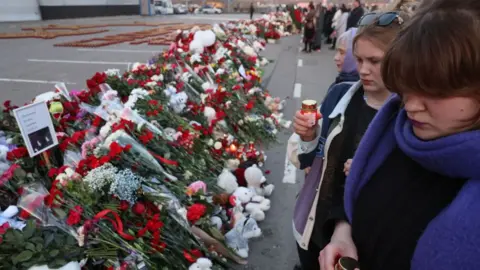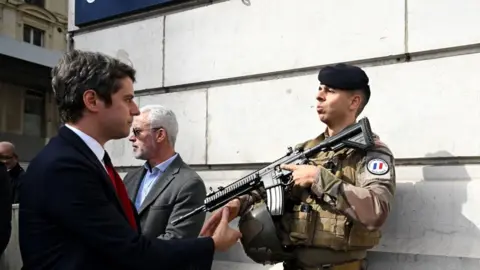Moscow attack: Russia blames West and Kyiv for jihadist massacre
 Getty Images
Getty ImagesTop Russian officials have directly accused Ukraine and the West of being involved in the deadly Moscow concert hall attack, after it was claimed by the Islamic State (IS) group.
IS has released video of the atrocity, but Vladimir Putin and two close allies have claimed the jihadists were helped by Western and Ukrainian intelligence.
Ukraine has rejected Russia's "lies".
The scenario is all the more unlikely because the US had warned Russia of an imminent attack 15 days earlier.
Russia says 139 people were killed when four armed men burst into the Crocus City Hall concert complex on Friday evening. Another 22 remain in a serious condition, including two children, officials say.
Four citizens of Tajikistan have appeared in court accused of carrying out the massacre. Four other suspects have been accused of aiding terrorism.
Ukrainian presidential adviser Mykhailo Podolyak said the facts about the perpetrators and "the failed incompetence of the Russian security services are indisputable". Western countries have also ridiculed the Kremlin's narrative.
The Russian leader acknowledged during a televised meeting on Monday: "We know the crime was committed by the hands of radical Islamists... we want to know who ordered it."
He argued that many questions remained unanswered, repeating an unfounded claim that the attackers had tried to flee south to Ukraine.
"Who was waiting for them there?" he asked. "This atrocity may be just a link in a whole series of attempts by those who have been at war with our country since 2014."
The US was trying to convince the world that Kyiv had no connection to the attack, he said, but he continued to point the finger at the West which he said was using Ukraine to fight against Russia.
One of Mr Putin's longest-serving allies, security council secretary Nikolai Patrushev, doubled down on Mr Putin's claim on Tuesday when he was asked whether IS or Ukraine was behind the attack: "Of course, Ukraine."
Then the head of Russia's FSB security service, Alexander Bortnikov, went further.
"We believe the action was prepared both by the radical Islamists themselves and, obviously, facilitated by Western special services. Ukraine's special services themselves have a direct connection to this."
Ukrainian President Volodymyr Zelensky has condemned the Russian accusations: "Putin was talking to himself again... Again, he blames Ukraine. A sick and cynical creature."
Belarus leader Alexander Lukashenko, a close Putin ally, appeared to cast doubt on the Russian narrative too, by suggesting the attackers had first tried to cross into his country before realising "there was no way they could enter Belarus".
The US has said IS is "solely" to blame for the Moscow attack and France's Emmanuel Macron said it would be "both cynical and counterproductive" for Russia to try to exploit the situation to seek to turn it against Ukraine.
Italian Foreign Minister Antonio Tajani said it was obvious Mr Putin was looking for pretexts to attack Kyiv, but said the videos of the attack were clear, and more than one IS claim confirmed the theory that it was involved.
The attack took place little over two weeks after the US embassy warned that "extremists have imminent plans to target large gatherings in Moscow, to include concerts". Mr Putin rejected the warning as provocative only last week.
Three days before the gunmen targeted Crocus City Hall on the north-west fringe of Moscow, the Russian leader accused the US of using its warning of an imminent attack to "intimidate and destabilise our society".
Meanwhile, Russia's FSB announced on Tuesday that it had foiled an attack by pro-Ukraine Russian fighters in the southern city of Samara. It said a member of the Russian Volunteer Corps paramilitary group had blown himself up after being apprehended.
 BERTRAND GUAY/POOL/EPA-EFE/REX/Shutterstock
BERTRAND GUAY/POOL/EPA-EFE/REX/ShutterstockThe Moscow attack, blamed by US intelligence on a regional branch of IS called Islamic State-Khorasan, has heightened fears of renewed jihadist plots in Western Europe, ahead of a summer of major international sporting events.
French Interior Minister Gérald Darmanin said on Monday night that France had been on maximum alert since Sunday night and Prime Minister Gabriel Attal said two attacks had been foiled since the start of the year.
"We thwart a lot of attacks in France, one every two months," Mr Darmanin said on France 2 TV. Paris is due to host the Olympic Games in fourth months' time and the interior minister said the main threat was homegrown but the external IS threat was seeing a resurgence.
Mr Attal said 4,000 extra soldiers would be deployed across France in the coming days.
Germany has said it will introduce temporary border controls for the European Championships starting in June. The government in Berlin has already imposed controls on some of its borders in a bid to tackle gangs smuggling migrants across Europe.
Interior Minister Nancy Faeser said controls would be imposed on all German borders during the tournament "to prevent potential violent offenders from entering the country".
In a separate development, Turkey said it had arrested 147 people suspected of links to IS in simultaneous raids across 30 cities. Ankara has confirmed that two of the four suspected attackers visited Turkey weeks before the Moscow attack and said they were able to travel freely there as there was no warrant for their arrest.
Italy says it has intensified security ahead of the Easter holidays and has urged people to be alert, although "there are no concrete risks".
